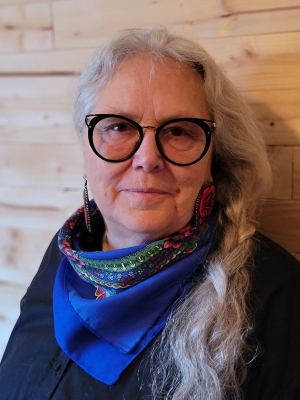A Transformative Force: Nipissing University alumnus Dr. Joyce Helmer champions culturally responsive Indigenous education

Dr. Joyce Helmer's career journey in education is as unique as it is inspiring. A Nipissing graduate with both a Bachelor and Master of Education, her story began in an unexpected place—a wrong classroom on the first day at Fanshawe College. Enrolled in the Social Service Worker Program, Dr. Helmer mistakenly attended an Early Childhood Teacher Education class instead. This serendipitous mistake set the course for a career that has profoundly impacted the educational landscape, especially for Indigenous communities in Ontario.
Reflecting on her time at Nipissing University, Dr. Helmer fondly recalls two pivotal experiences. The first was with Professor Jack Jones, who welcomed her to campus with warmth and familiarity, embodying the collaborative and respectful relationship she believes should exist between learners and educators. The second influential figure was Dr. Michael Wodlinger, whose practice of expressing gratitude for his students’ work upon submission, profoundly changed her perspective on education.
“It was the first time I had ever been thanked for submitting my understandings, thoughts and ideas about a topic. It literally changed everything for me in that moment. The level of respect and honour that is required to be a transformative education collaborator is essential, and a practice that I never forget in all of my current interactions with learners, research participants or colleagues,” Dr. Helmer said.
These experiences underscored the importance of respect, collaboration, and the personal nature of the educational journey - values that Dr. Helmer has carried throughout her career.

Her journey at Nipissing University was instrumental in aligning her educational goals with her professional aspirations. The flexibility of Nipissing’s programs allowed her to balance work and study, engage in various learning modalities, and build a network of educational leaders. Despite challenges such as working in remote communities and the inefficiencies of early correspondence courses, Dr. Helmer’s relentless pursuit of education saw her complete her doctorate just before her 60th birthday.
Dr. Helmer's early experiences in education were marked by a deep commitment to culturally responsive teaching.
“One of the transformational moments that motivated me to continue a career in education was working in an isolated fly-in community where the curriculum materials included flashcards of traffic signs. This community had no traffic signs and yet these flashcards were used often. I decided then and there that I could do better to create a culturally responsive curriculum that the children would respond to from their hearts and not just their heads,” Dr. Helmer recalled.
This experience ignited her passion for developing curricula that resonate with the cultural and linguistic realities of learners. Her work at the First Nations Technical Institute (FNTI) during the COVID-19 pandemic was particularly notable. Her doctoral dissertation, The Search for Sacred Space in Cyberspace: A Two World Story, provided the framework for transitioning FNTI’s programs to a virtual environment, ensuring that cultural ceremonies and learning continued seamlessly online. This innovative approach not only preserved, but enriched the educational experience for Indigenous learners, solidifying FNTI’s position as a leader in Indigenous postsecondary education.
Dr. Helmer's dedication to education was recognized with the Minister of Colleges and Universities’ Awards of Excellence. Her initial reaction was one of humble curiosity.
“My initial and almost immediate thought was ‘What could my nominator have said?’ I was obviously honoured to be recognized, and was particularly thrilled that the category was recognizing how my life work will make a difference, and the sacrifices that I have made have been acknowledged,” said Dr. Helmer. “This award demonstrates to me that someone is hearing me and that I have made a difference in someone’s life. As an education leader, it cannot get better than that!”
Dr. Helmer attributes much of her educational philosophy to her mother, Aline Lebrun, who, despite limited formal education, displayed incredible ingenuity and resilience. Her mother’s ability to learn through observation and practice instilled in Dr. Helmer a sense of confidence and a commitment to fostering positive educational experiences for all learners. This personal influence is a testament to the power of informal learning and the importance of adaptability in education.
Though Dr. Helmer is past the typical retirement age, her passion for education remains strong. She continues to contribute to projects that align with her values and aspirations, focusing on initiatives that foster meaningful, culturally responsive education. Her dedication to continuous learning, professional development, and the integration of Indigenous Knowledge into curricula ensures that her work will continue to inspire and influence future generations.
For those pursuing a career in education today, Dr. Helmer emphasizes the need for relentless resilience, a sense of wonder, and an openness to failure. A particularly rewarding moment in her career came when a former student approached her 25 years after graduation, expressing how she had changed their life—an affirmation of the profound impact educators can have.
To the Nipissing University community, Dr. Helmer expresses her deep gratitude for the support and opportunities provided during her studies. Her journey underscores the belief that willing learners will always find the teachers they need. Dr. Helmer’s career is a testament to the transformative power of education and the enduring impact of culturally responsive teaching.
